chapter 7
Human Sociality
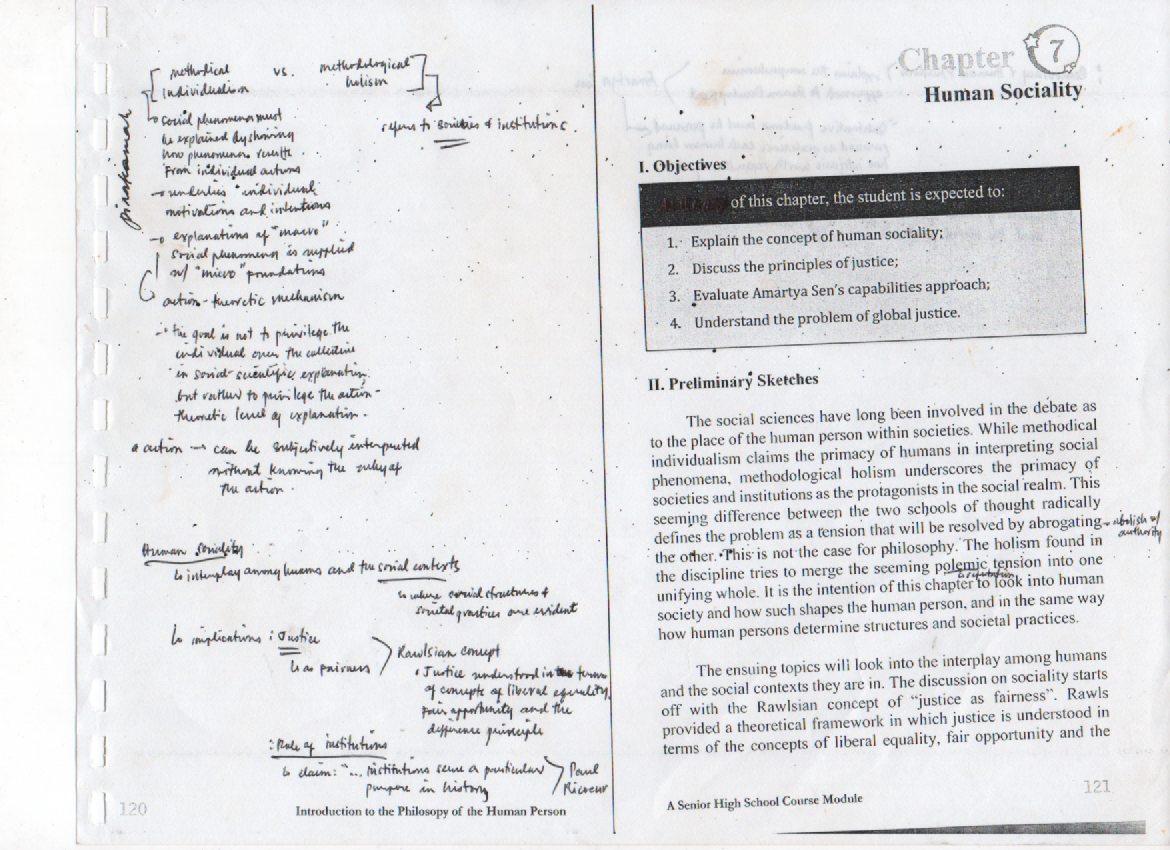
I. Objectives
-
Explain the concept of human sociality
Understanding how individuals interact and form societies is crucial for exploring social behavior. -
Discuss the principles of justice
Examining various theories of justice helps in assessing moral and ethical standards in society. -
Evaluate Amartya Sen’s capabilities approach
This approach focuses on enhancing individual capabilities as a measure of development rather than just economic growth. -
Understand the problem of global justice
Exploring inequalities on a global scale and how justice can be shared among different cultures and societies.
II. Preliminary Sketches
- The social sciences are engaged in the debate regarding the role of the individual within society.
Key Concepts:
-
Methodical Individualism:
Claims the primacy of individual actions in interpreting social phenomena. This perspective emphasizes personal agency and responsibility. -
Methodological Holism:
Opposes individualism by prioritizing societies and institutions as primary units of analysis. It suggests that social structures shape individual behavior.
Tension Between Individualism and Holism:
- There exists a philosophical tension, described as a polarizing debate, where each approach presents differing views on human interaction within a societal context.
Theories of Justice:
- Rawlsian Concept of Justice:
Introduces ideas related to fairness and equality. Justice is seen as providing fair opportunities and principles that ensure equity among citizens.
Role of Institutions:
- Institutions provide particular purposes within societal contexts; they help maintain order and structure in human interactions. This aligns with Paul Ricoeur's views on the significance of institutions in shaping societal roles.
Insights:
- Understanding both individual and societal perspectives is vital for analyzing complex social dynamics.
- The exploration of justice theories allows a more comprehensive view of equity in social structures, which can vary widely between different cultures and societies.
Note: The discussions likely emphasize a balance between understanding individual actions and the broader societal framework in which these actions take place.
Extended readings:
Introduction to the Philosophy of the Human Person
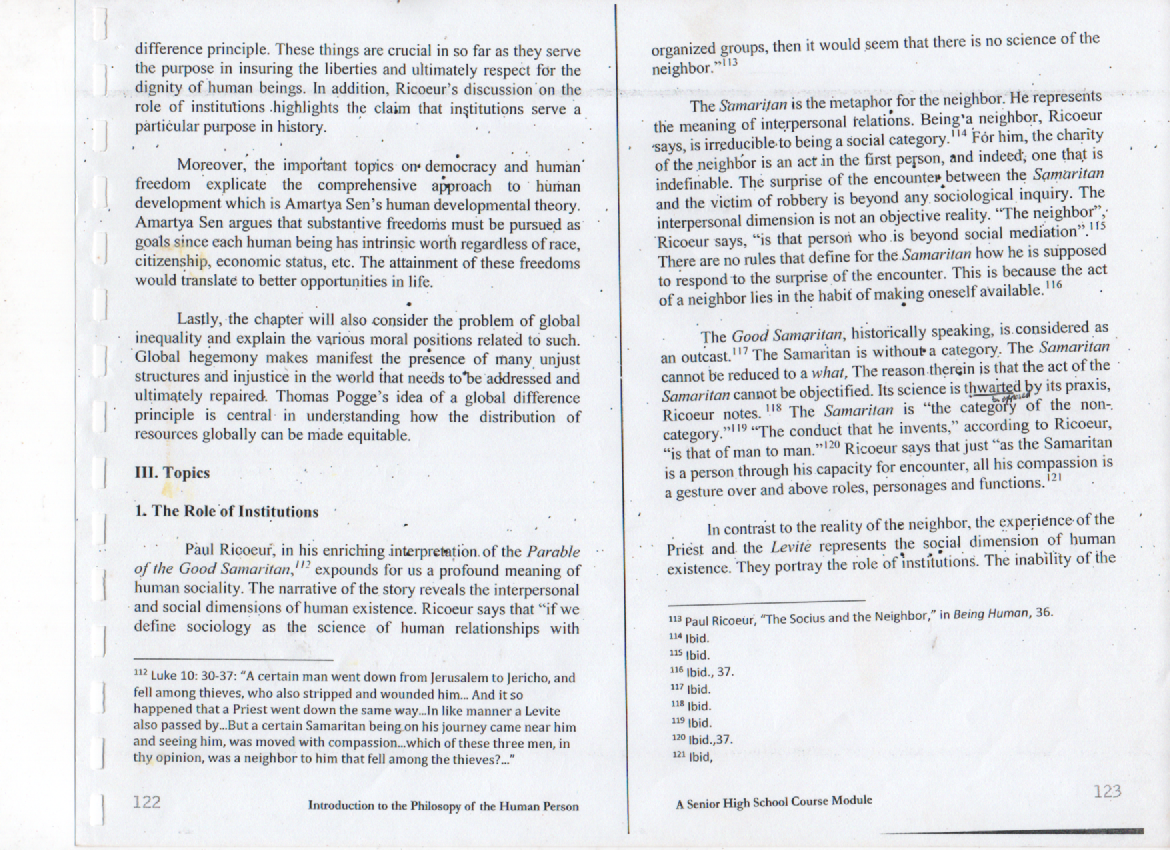
I. Key Concepts
1. Difference Principle
- Definition: Refers to principles that ensure the insurances of liberties and respect for the dignity of human beings.
- Importance: It underlines the necessity of fair institutions that serve specific purposes in history.
- Insight: A key component in social justice discourse, emphasizing that inequalities in society should benefit the least advantaged members.
2. Human Development
- Theories: Amartya Sen’s human developmental theory emphasizes substantive freedoms.
- Key Points:
- Each individual has intrinsic worth, regardless of race or citizenship status.
- Economic status impacts access to opportunities.
- Insight: Understanding human development requires a multifaceted approach taking into account various socio-economic factors.
3. Global Inequality
- Focus: The impact of global hegemony on structures of injustice and inequality.
- Key Thinker: Thomas Pogge advocates for a "global difference principle" to address these issues.
- Insight: The principle highlights the global responsibilities in distribution and resource equity.
II. Topics
1. The Role of Institutions
- Key Figure: Paul Ricoeur’s interpretation of the Parable of the Good Samaritan elaborates on the interpersonal nature of human society.
- Key Insights:
- The story illustrates the significance of social relationships and the act of compassion.
- Institutions often fail to meet the social dimensions of human existence.
2. The Good Samaritan
- Historical Context: Considered an outcast who exemplifies true neighborliness.
- Metaphor: Represents the meaning of interpersonal relations and the act of responding to immediate needs.
- Key Ideas:
- The act of being a neighbor is described as an indeterminate response, meaning it cannot be fully captured by rules or laws.
- The Samaritan's actions should not be reduced to an objective standard.
3. The Priest and the Levite
- Contrasting Figures: Represent institutional roles and highlight their failings.
- Insight: The inability of institutions (like the priest and Levite) to act compassionately points to systemic issues within social frameworks.
III. References
- Key Source: Paul Ricoeur, "The Socius and the Neighbor," in Being Human.
- Relevant Biblical Reference: Luke 10:30-37, which recounts the parable of the Good Samaritan and emphasizes the ethical implications of neighborliness.
These notes summarize the exploration of human dignity, moral inequality, and the role of institutions in fostering social relations, reflecting on key thinkers and their philosophical perspectives.
Extended readings:
Introduction to the Philosophy of the Human Person
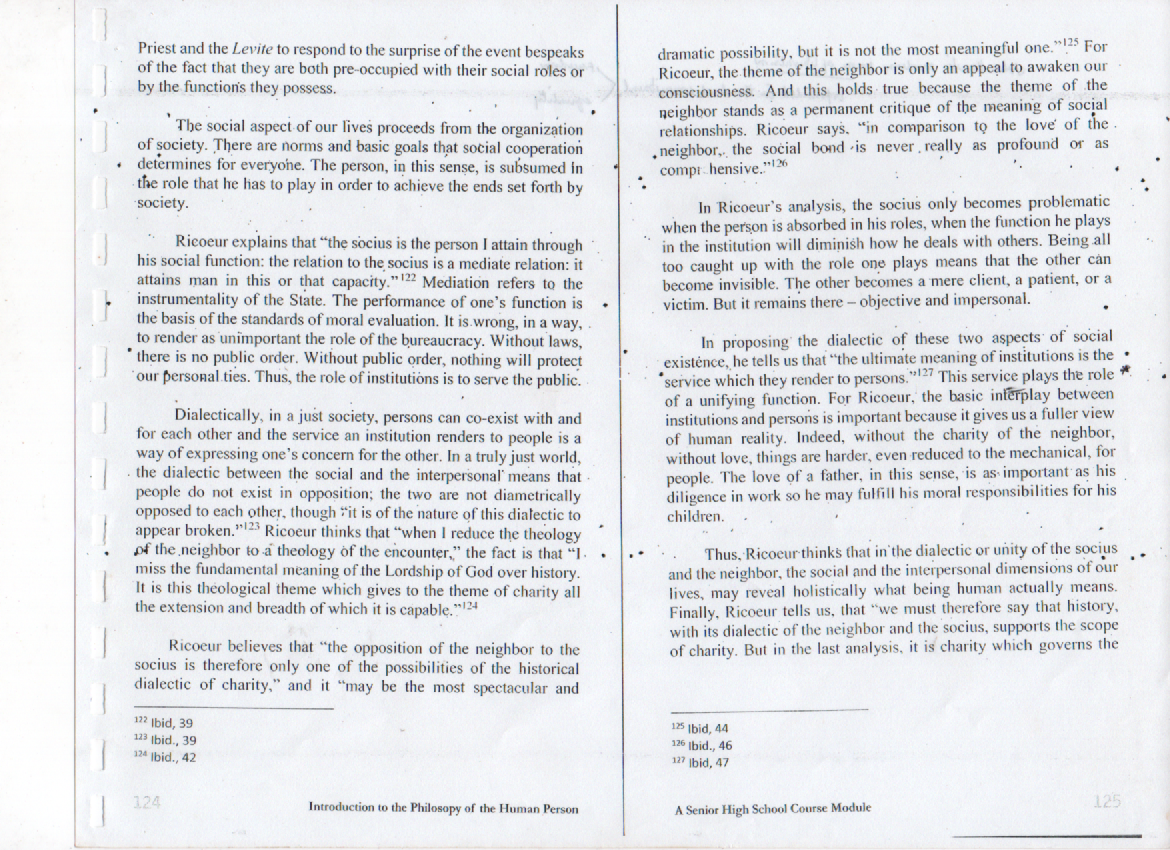
Social Aspect of Human Existence
- Role of Society: The organization of society influences personal roles and social cooperation.
- Insight: Society functions through norms and goals that individuals adapt to in their roles, emphasizing the importance of social structures.
Ricoeur's Analysis of the Socius
- Definition of Socius: Ricoeur describes the socius as the person one attains through social function—mediating relationships within society.
- Additional Info: This encompasses the dynamic interaction between individuals and the institutions around them.
Mediation and Bureaucracy
- Mediation Role: Refers to the function of institutions, like the State, which may render individual roles insignificant if public roles diminish.
- Terms: Mediation—active participation and engagement within the social fabric.
Dialectic in Justice
- Coexistence and Justice: In a truly just society, individuals coexist and institutions address communal concerns.
- Insight: The interplay between social and interpersonal aspects indicates how individuals relate to one another through shared systems.
Church and the Theme of the Encounter
- Theology of the Encounter: Ricoeur reminds us that personal relations embodied by the "neighbor" unwind within a broader theological framework.
- Insight: This underlines the importance of viewing encounters through a lens of charity, emphasizing human interconnectedness.
Charity and Socius
- Charity's Role: Ricoeur suggests charity extends beyond mere obligation, expanding the understanding of moral responsibility.
- Insight: The concept of charity as a guiding principle illuminates the personal and societal dimensions of moral action.
Conclusion
- Unity of Socius and Neighbor: Understanding both aspects (socius and neighbor) fosters deeper insights into human existence and responsibility.
- Additional Info: History and context shape the relationship between individuals and society, emphasizing charity as the guiding force of interactions.
Extended readings:
Justice and Equality
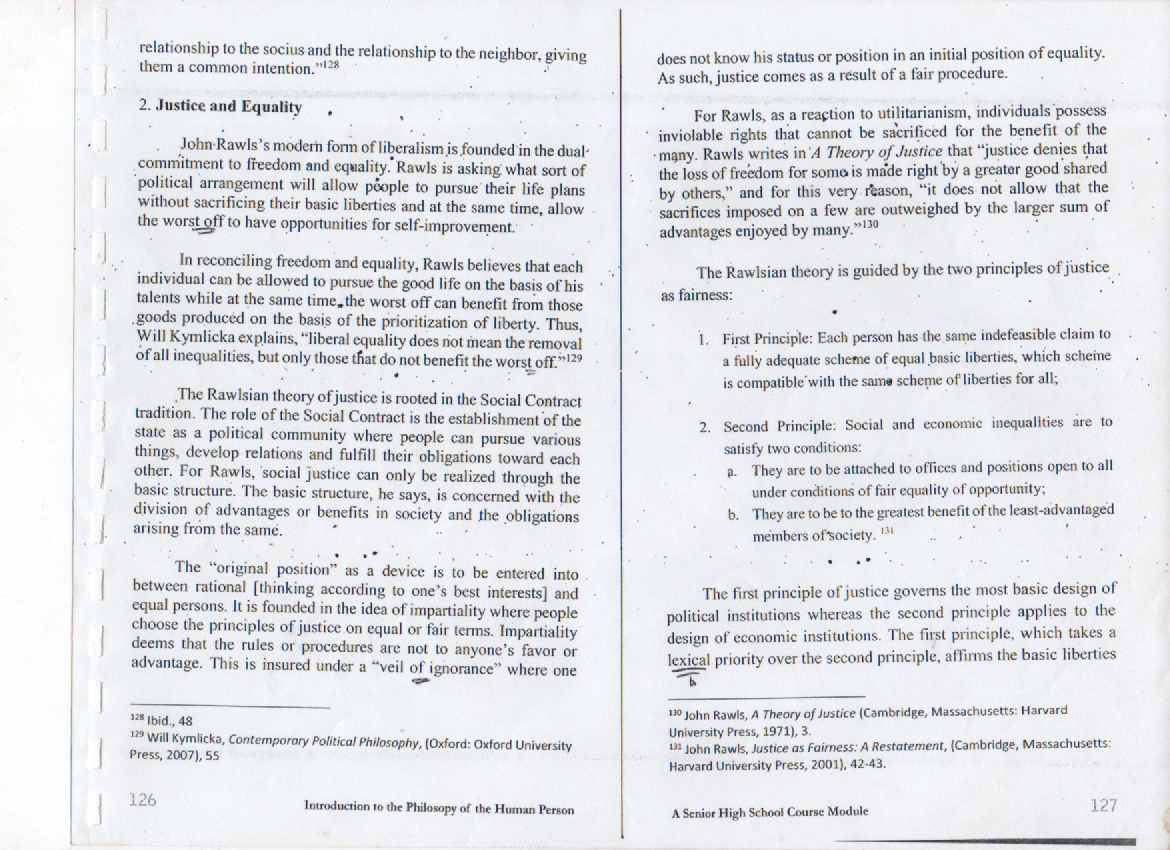
John Rawls's Theory
-
Modern Liberalism: John Rawls' framework combines a commitment to freedom and equality within political arrangements that allow people to pursue their lives while ensuring the least advantaged have opportunities for self-improvement.
- Insight: This approach critiques traditional liberalism, presenting a more egalitarian view of justice.
-
Freedom and Equality: Rawls believes individuals should pursue the good life based on their talents, with protections in place for the worst-off to benefit from resources.
- Additional Info: This reflects the principle that social cooperation should prioritize the needs of the least advantaged.
The Rawlsian Social Contract
-
Social Contract Tradition: The framework relies on a theoretical contract where individuals form a political community to pursue various goals while adhering to mutual obligations.
- Insight: This approach emphasizes collective responsibility and social justice as foundational to political theory.
-
Rawls's Concept of Justice: Justice can only be realized through the structure that ensures fairness and equitable distribution of benefits and obligations.
- Framework: Benefits and obligations must stem from a fair and equitable social structure rather than arbitrary advantages.
The Original Position and Veil of Ignorance
-
Original Position: A hypothetical scenario where rational individuals decide on the principles of justice impartially.
- Insight: This model is essential for building a just society that respects equality.
-
Veil of Ignorance: Individuals must make decisions without knowledge of their personal circumstances (e.g., status, wealth, abilities) to ensure fairness.
- Significance: This principle aims to eliminate bias and self-interest in crafting justice policies.
Principles of Justice as Fairness
-
First Principle: Each individual has an indefeasible claim to a fully adequate scheme of equal basic liberties.
- Insight: This assertion underscores the importance of individual rights in a just society.
-
Second Principle: Social and economic inequalities must satisfy two conditions:
- a. Inequalities are to be attached to positions open to all under conditions of fair equality of opportunity.
- b. They should benefit the least-advantaged members of society.
- Additional Info: This reflects Rawls's view that a just society must aim to improve the welfare of its most disadvantaged citizens.
Summary
- Lexical Priority: The first principle takes precedence over the second, affirming the importance of basic liberties before addressing socio-economic inequalities.
- Governance of Justice: The principles govern the foundational aspects of political institutions and the design of economic inequalities to ensure fairness.
This structured overview provides insights into John Rawls's concept of justice and equality, emphasizing the balance between individual liberties and the role of societal structures in ensuring fairness.
Extended readings:
Notes on Development as Freedom
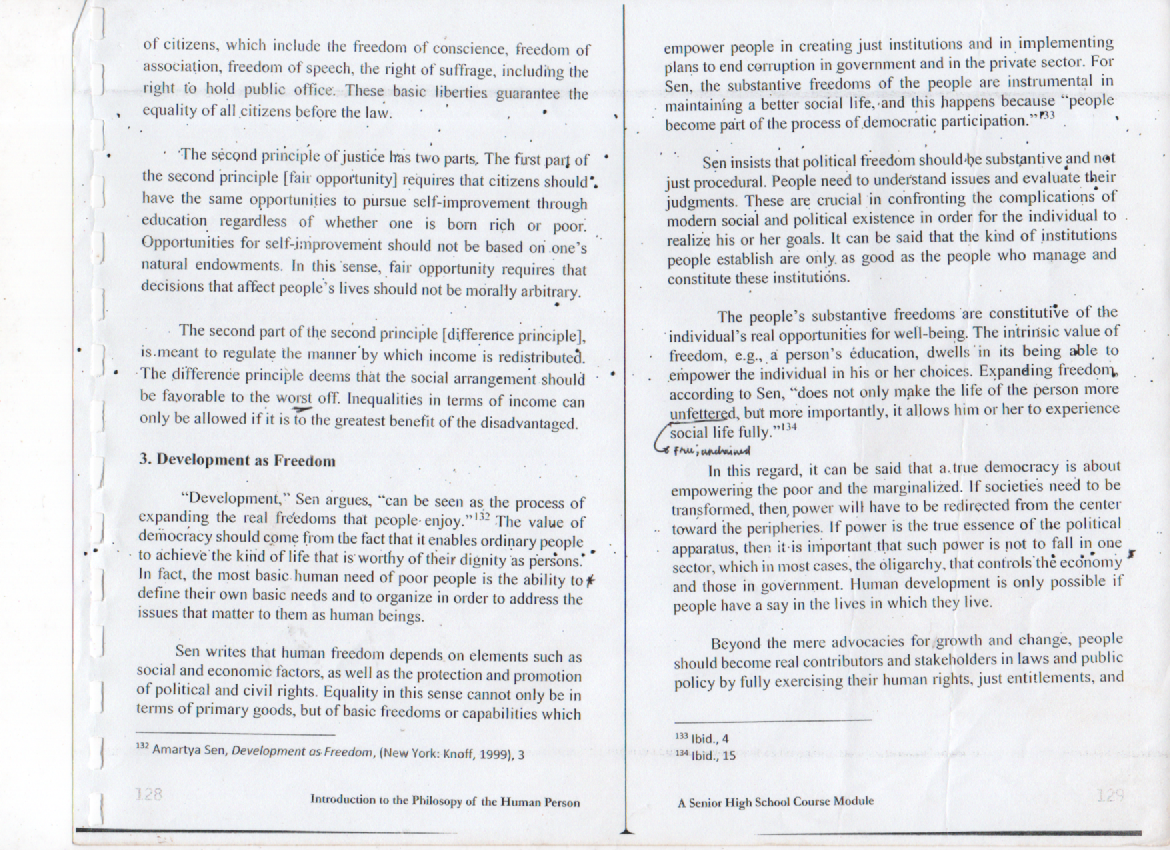
Key Principles of Justice
- Two Parts of the Second Principle:
- Fair Opportunity: Citizens should have equal chances for self-improvement, regardless of their socioeconomic background. This emphasizes the importance of access to education and resources.
- Insight: Self-improvement opportunities should not be arbitrary and must consider individual circumstances to ensure equitable chances for all.
- Difference Principle: This principle governs how social arrangements should favor those who are disadvantaged. Redistribution of resources should aim to benefit the worst-off individuals in society.
- Insight: Inequalities in resources should be justifiable if they contribute to the maximum benefit of the least advantaged.
- Fair Opportunity: Citizens should have equal chances for self-improvement, regardless of their socioeconomic background. This emphasizes the importance of access to education and resources.
Development as Freedom
- Concept: Development is viewed as the expansion of real freedoms that enable individuals to pursue well-being. The notion emphasizes empowerment, allowing individuals greater control over their life choices.
- Insight: Development moves beyond mere economic growth to encompass the enhancement of human capabilities and opportunities.
- The Role of Democracy:
- Democracy should fundamentally empower those who are marginalized. The realization of democracy relies on everyone being able to participate in decision-making.
- Insight: True empowerment involves addressing issues that matter to individuals and ensuring their voices are included in governance.
- Democracy should fundamentally empower those who are marginalized. The realization of democracy relies on everyone being able to participate in decision-making.
Importance of Human Freedoms
- Human freedom is dependent on social, economic, political, and civil rights. Effective development must focus on basic freedoms that allow for meaningful participation in society.
- Insight: Basic freedoms include not only safety and security but also the capacity for individuals to express themselves and access necessary resources.
Additional Considerations
- Structural Change: To empower the marginalized, power dynamics within societal structures need to be transformed. This often involves redistributing power from centralized authorities to local communities.
- Public Policy: Individuals should engage actively in advocating for laws and policies that protect their rights and entitlements, contributing to the democratic processes.
- Insight: Engagement in public policy is crucial for human development, as it allows for the expression of individual rights and responsibilities.
Citations
- Sen, Amartya. Development as Freedom. New York: Knopf, 1999.
- References to page numbers indicate the sources of specific concepts discussed.
Extended readings:
Global Justice
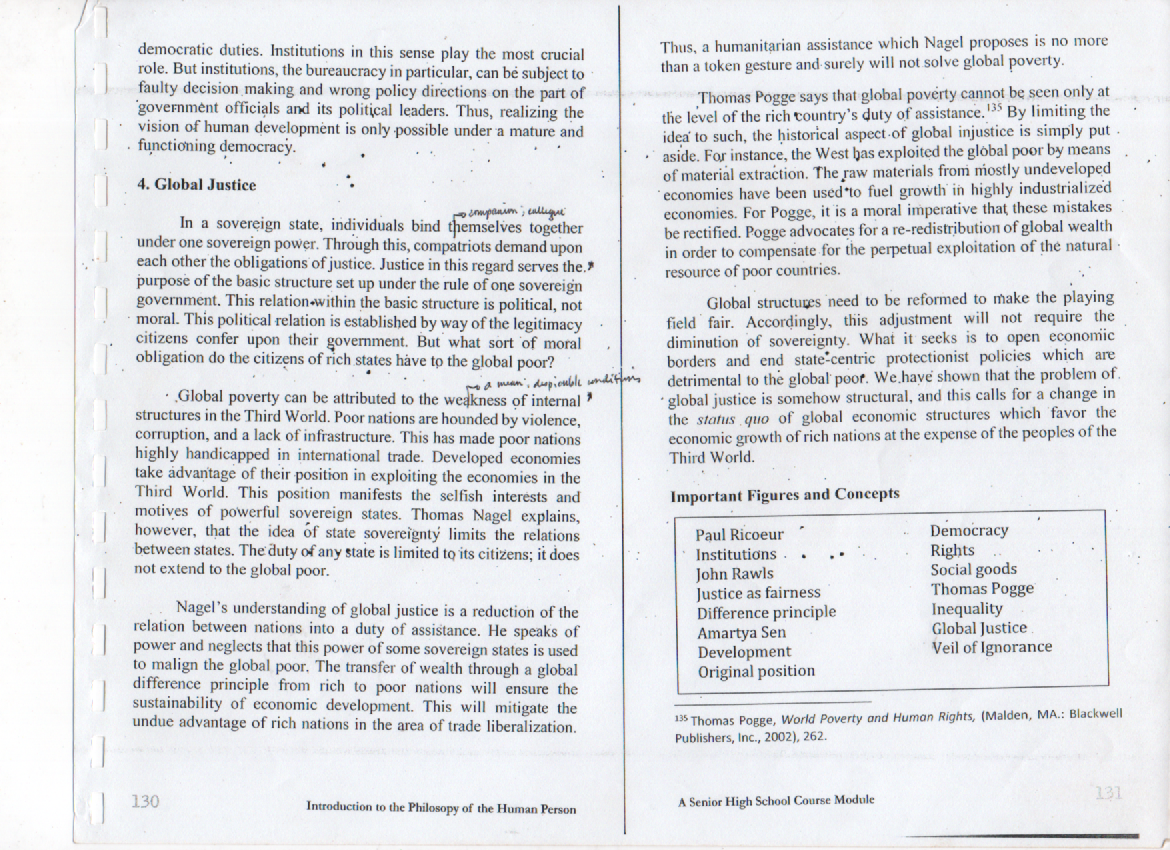
Key Concepts
-
Sovereign State: Individuals come together under a single authority, creating a framework of justice obligations.
- Implication: The moral foundation relies on the legitimacy conferred by citizens to their government.
-
Global Poverty: Attributed to the internal weaknesses in Third World countries, which suffer from violence, corruption, and inadequate infrastructure.
- Insight: The lack of these key structures hampers international trade and overall economic stability, resulting in a cycle of poverty.
Thomas Pogge's Arguments
-
Global Poverty's Visibility: Pogge argues that poverty cannot be seen solely at the level of a wealthy nation’s charitable actions.
- Key Idea: Historical practices of exploitation, such as the West's treatment of the global poor, must be rectified.
-
Economic Structures:
- Call for reform in global structures to ensure fairness in economic relations.
- Adjustment of Sovereignty: This requires opening economic borders and curbing state-centric protectionist policies that disadvantage poorer nations.
Thomas Nagel's View
- Nature of Global Justice: Nagel sees global justice as a limitation of sovereign powers, which are often misused to perpetuate global poverty.
- Significance: The idea of state sovereignty restricts the extent of moral obligations from one state’s citizens to the global poor, highlighting a fundamental issue in global justice debates.
Important Figures and Concepts
| Figures/Concepts | Description |
|---|---|
| Paul Ricoeur | Philosopher, contributions to ethics and justice. |
| John Rawls | Theorist of fairness and social justice principles. |
| Amartya Sen | Advocate of development and capabilities approach. |
| Thomas Pogge | Critique of global poverty and systemic inequalities. |
| Global Justice | The pursuit of fairness and equity on a global scale. |
| Veil of Ignorance | A principle to ensure fair justice without bias. |
Summary
- Global justice encompasses the moral responsibilities of richer nations towards poorer ones. The dynamics of poverty and wealth are complex, necessitating changes to international structures and the way sovereignty is understood and exercised to promote equitable economic opportunities.
Extended readings: